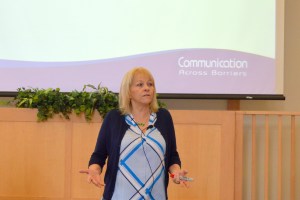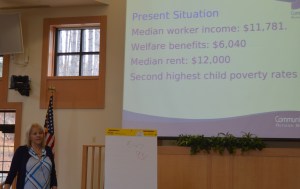FARMINGTON — When author and national speaker Donna Beegle asked a room of community leaders Thursday what Maine’s minimum wage is, there was little response.
It was a fact she suggested that they learn.
An informed community is a necessary step to changing the approach to poverty, she said.
Beegle, who resides in Oregon, is the author of “See Poverty, Be The Difference,” a resource book for professionals who work with people in poverty, according to the website. She is also co-founder of Communication Across Barriers, an organization dedicated to “making a difference for people who live in the crisis of poverty,” the website states.
She spoke to a small gathering Thursday morning at Franklin Memorial Hospital, the start of a day and half visit to Franklin County. She planned to talk with students in School Administrative District 58 later in the day and at the Community Health Needs Assessment Forum on Thursday evening at Spruce Mountain Middle School in Jay.
Beegle will meet with Regional School Unit 9 teachers Friday morning before talking about her Opportunity Community model for approaching poverty at noon Friday in Bjorn Auditorium on the Mt. Blue Campus in Farmington.
Beegle will share her knowledge through the presentation, “An Insider Perspective On What Works” which addresses how we might do things differently, she said.
“We are losing potential today to poverty,” she said. “We spend money on symptoms. We need to invest in people.”
She suggested a paradigm shift. On the website, Beegle suggests one that “moves us beyond stereotypes and judgment to a deeper understanding of the causes of poverty and its impact on human beings.”
Her wisdom is based on personal experience.
Beegle shared her story of growing up, picking fruit crops with her family. Often homeless, isolated and not knowing the words and practices of middle-class America, family members, along with others in poverty, were misjudged as ignorant and unmotivated.
She is also the only member of her family who has not been incarcerated, she said.
The family and Beegle’s work is the topic of the PBS documentary, “Invisible Nation.” Filming began in 1996. Beegle said she feels the film may begin to shift the approach to poverty.
Although she left school at age 15 and had two children and was divorced by age 25, Beegle said she was lucky to have an opportunity to earn a general education diploma at age 26, which led to earning a doctorate in educational leadership within 10 years.
One of her first hurdles was to learn the language used by the middle class so she could navigate her way through school and a career. College was her first exposure to middle-class norms and practices, she said.
“I didn’t know; I didn’t have a clue,” she said about the isolation of poverty and judgments made about poor people. “I thought I was not very bright. We are segregated in America by social class.”
She grew up believing that people didn’ t care when they didn’t reach out to help her family. She proposes treating people in poverty with respect and dignity and supporting their abilities.
It can have a ripple effect, she said, mentioning that family members have followed in her footsteps and sought college degrees.
Quoting statistics, including ones from the local community, Beegle endorsed studying poverty and understanding its effect on people.
“We have to come together as a community,” she said. “Failure is not an option. We can pay for symptoms or pay by investing in our people.”
Regional School Unit 9, Regional School Unit 73, Franklin Community Health Network, the Healthy Community Coalition and others were instrumental in bringing Beegle to Farmington.


Comments are no longer available on this story